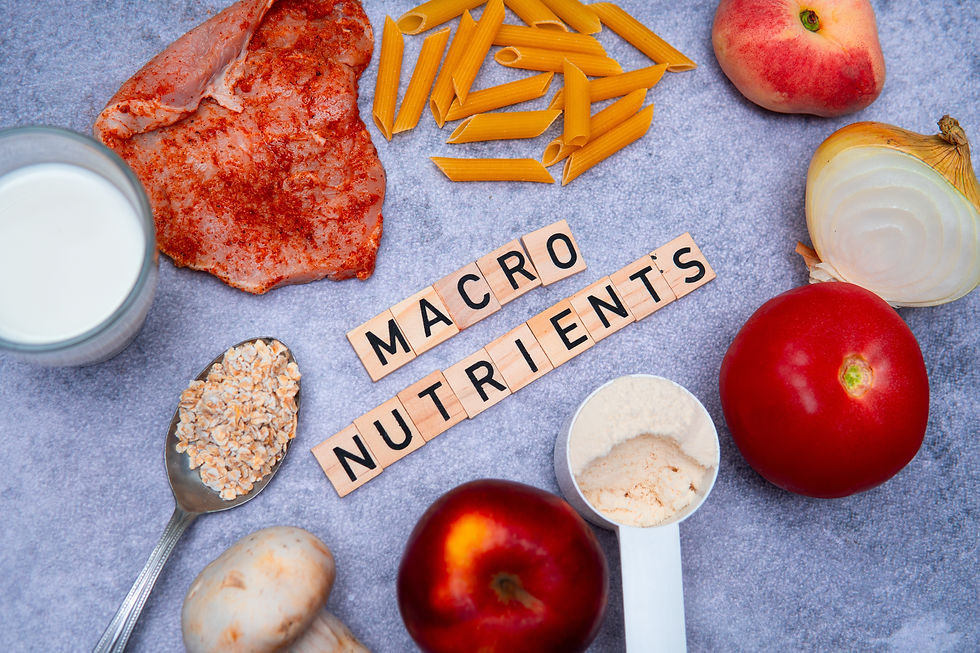Understanding Macros: The Key to Successful Weight Loss While on Medication
- Jessica

- Jan 18
- 3 min read
When it comes to achieving your weight loss goals, understanding macronutrients—often referred to as "macros"—is essential, especially if you are taking weight loss medication. While these medications can aid in your journey, combining them with a well-balanced diet that considers your macro intake can significantly enhance your results. In this blog post, we’ll explore what macros are, their importance in weight loss, and how to calculate them effectively.

What Are Macronutrients?
Macronutrients are the nutrients that provide us with energy and are essential for our body’s functioning. They are classified into three main categories:
1. Carbohydrates: These are the body’s primary source of energy. They can be found in foods like fruits, vegetables, grains, and legumes. Carbs can be further divided into simple (sugars) and complex (starches and fiber).
2. Proteins: Essential for building and repairing tissues, proteins are vital for maintaining muscle mass during weight loss. Good sources include meat, fish, eggs, dairy products, legumes, and nuts.
3. Fats: While often misunderstood, fats are crucial for hormone production and nutrient absorption. Healthy fats can be found in avocados, nuts, seeds, olive oil, and fatty fish.
Why Are Macros Important for Weight Loss?
When you’re taking weight loss medication, your body may respond differently to food intake. Here’s why understanding and managing your macros is crucial:
1. Enhancing Medication Efficacy: Some weight loss medications work by suppressing appetite or altering metabolism. By eating a balanced diet rich in the right macros, you can maximize the effects of the medication and help your body adapt better.
2. Maintaining Muscle Mass: During weight loss, it’s common to lose muscle along with fat. A higher protein intake can help preserve muscle mass, which is essential for maintaining a healthy metabolism.
3. Sustained Energy Levels: Carbohydrates are vital for energy, especially if you’re incorporating exercise into your routine. Choosing the right types of carbs can help you maintain energy levels throughout the day.
4. Long-term Success: Learning about macros encourages a healthier relationship with food. It can help you make informed choices and develop sustainable eating habits, which is crucial for lifelong weight management.
How to Calculate Your Macros
Calculating your macros can seem daunting at first, but with a few simple steps, you can determine the right balance for your weight loss journey:
1. Determine Your Caloric Needs: Start by calculating your Total Daily Energy Expenditure (TDEE). This can be done using various online calculators that factor in your age, weight, height, gender, and activity level.
2. Set Your Goals: Decide on your weight loss goal. A common approach is to aim for a caloric deficit of 500-1000 calories per day to lose approximately 1-2 pounds per week.
3. Decide Your Macro Ratios: A typical macro ratio for weight loss might look like this:
- Protein: 25-30%
- Carbohydrates: 45-55%
- Fats: 20-30%
These ratios can be adjusted based on personal preferences, dietary restrictions, and how your body responds.
4. Calculate Your Macros:
- Protein: Multiply your total calories by your protein percentage and divide by 4 (since there are 4 calories per gram of protein).
- Carbohydrates: Multiply your total calories by your carbohydrate percentage and divide by 4.
- Fats: Multiply your total calories by your fat percentage and divide by 9 (since there are 9 calories per gram of fat).
5. Track Your Intake: Use food tracking apps or journals to monitor your daily intake and ensure you’re staying within your macro goals.
Conclusion
Incorporating an understanding of macronutrients into your weight loss journey—especially when using weight loss medication—can lead to more effective and sustainable results. By focusing on a balanced diet and mindful eating, you can enhance the benefits of your medication and pave the way for a healthier future.
If you’re considering weight loss medication or need guidance on how to create a customized nutrition plan, don’t hesitate to reach out to our team at Virtual Care Clinic
. Together, we can help you achieve your weight loss goals while ensuring that you feel your best every step of the way!
Happy tracking! 🥗💪



Comments